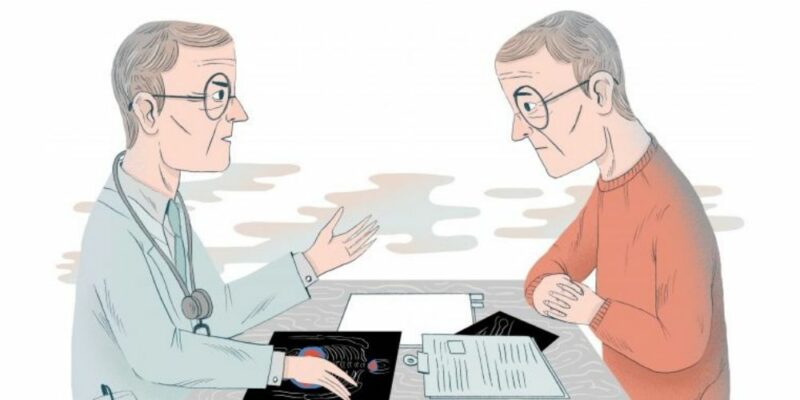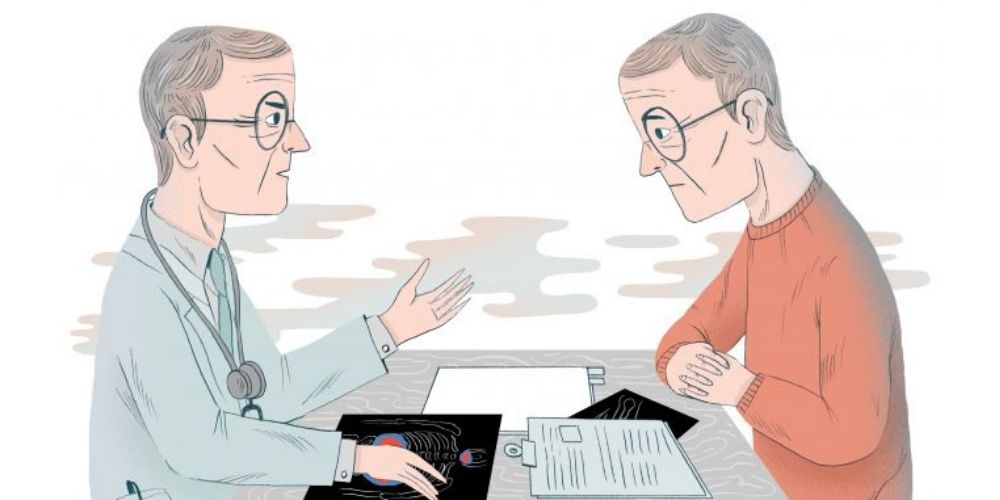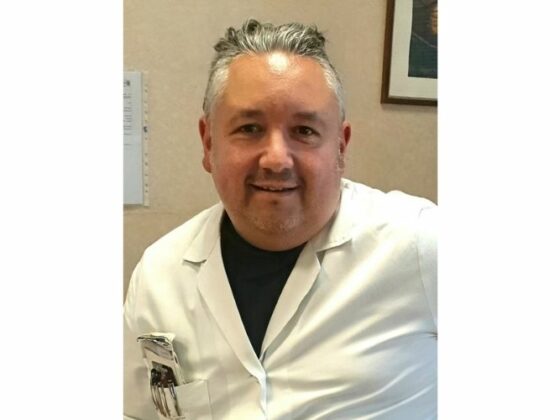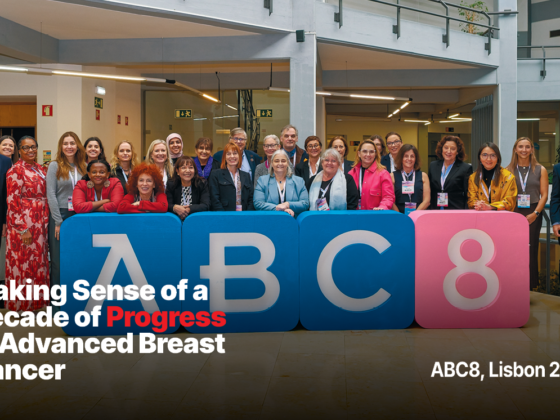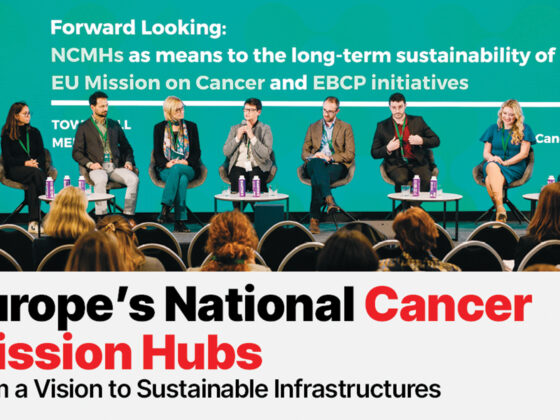“I try not to think about it. However, a few times a day, I have moments of a few seconds when I feel like panic is taking over me. After a while everything passes, but I can’t handle it very well.”
When Jacek Jassem, Head of the Department of Oncology and Radiotherapy at the Medical University of Gdańsk in Poland, was diagnosed with advanced non-Hodgkin lymphoma, he picked up a pen and started writing personal notes about his experiences as a patient.
For this scientist and clinician, immersed in the study of the molecular biology of cancer, and present for more than forty years at the bedside of cancer patients, finding himself on the wrong side of the consulting table was frightening.
“I still remember how terrified I was,” he says, three years after his diagnosis. “I was only consoled by the fact that it was not advanced lung cancer, as indicated by the first tests. However, I knew that I was facing severe, aggressive treatment with uncertain results”.
At the time, the notes served a very practical purpose of keeping his large group of friends informed about how he was progressing, without having to give individual responses to their enquiries about his health and well-being. Later, however, he decided to use them as a basis for a ‘diary’, which was published in 2020 under the title ‘Zatrzymane w biegu’ (Stopped in my tracks). The book talks very openly about every aspect of his experience, and its publication has led to many interviews on radio and in newspapers, giving him a wide platform to pursue his mission to demystify cancer ‒ to be honest about how grim some symptoms, side-effects and complications can be, and offer reassurance about the chances of making it through the journey and coming out the other end.
Diagnosis: caught off guard
Psychologist Dorota Minta has supported doctors who have not been able to cope with their emotions during their own cancer treatment, and sees Jassem’s decision to talk so publicly about his personal experience as a sign of courage. “Their profession gives many doctors a feeling of driving force,” she says. “Not everyone feels like ‘gods’, as cardiac surgeons are presented in many films. But they are no stranger to the belief that they are stronger and more resilient than the average person they treat on a daily basis.”
“Most tumours are blind chance, so why should they bypass oncologists?” asks Jassem. Andrzej Cichocki, a surgeon and oncologist at the National Institute of Oncology in Warsaw, gave little thought to why he ended up diagnosed with the same type of cancer that he had been removing from his patients for many years. “Apparently destiny,” he says. “I have a stoic approach to life and death, so when I heard the diagnosis, I was reconciled with it.”
“I turned yellow as if a stone had jammed in the cable outlet”
His disease appeared suddenly at Christmas ‒ a 2-cm tumour located in the hepatopancreatic duct, blocking the flow of bile and pancreatic juice into the duodenum. “I turned yellow as if a stone had jammed in the cable outlet. Gallstones would be easier to justify, as that is the most common cause of mechanical jaundice, and I had been slimming a bit, which is also sometimes conducive to it. But where does this cancer come from?”
In the logic of neoplastic disease, which every oncologist knows inside out, lies a trick to hide from the host, which is how the initially innocent symptoms dull our vigilance. For Jassem, slightly enlarged lymph nodes in his neck were not immediately associated with a dangerous lymphoma. Establishing a diagnosis begins with ruling out the worst in many patients – unfortunately, the worst sometimes turns out to be a direct hit.
How to tell your loved ones at home – most newly diagnosed patients have trouble with that. Doctors face an additional ‘occupational hazard’ ‒ news spreads quickly, as it is hard to hide ill health from colleagues, which can put them under pressure to be open about it from the start.
“Several times I was close to death, I had to undergo six operations, with the final removal of the entire pancreas. This was not how I planned it”
“I did not want to be operated in my ward, being aware of possible complications, which I preferred not to burden my team with,” admits Cichocki. His concerns turned out to be justified: after the first operation Cichocki experienced an anastomotic bleeding, and further down the road there were three more bleeding episodes, an abscess, and then bacterial and fungal infections. “Several times I was close to death, so for three months I had to undergo six operations, with the final removal of the entire pancreas. This was not how I planned it.”
Too much knowledge
Minta believes it may be better not to know too much about the possible complications and toxic side effects that may occur down the line, in order to start treatment with greater peace of mind. Too much awareness can be a burden, she says.
That was less of a problem for Jassem, mainly because his expertise lies in medical and radiation therapy for solid tumours, while lymphomas are the domain of haematologists. “Oncological haematology is today a separate field of medicine,” he explains. Despite this, many years of practice gave him some idea about what might await him during aggressive chemotherapy: “I realised that at my age I might tolerate treatment worse than young people.”
And that’s what happened: severe inflammation of the lining of his mouth, yeast in his lungs, blood clots in his veins, damage to his peripheral nerves. He had to take pain-relieving morphine, twice daily heparin injections and antifungal medications lasting several months. The list of drugs, excluding chemotherapy, at one point included 11 items. “I always told my students that cancer cannot be treated with mercy, so I had to humbly accept that it also applied to me.”
Cichocki calls himself a difficult patient. “I’ve carefully checked how they treat me. Older and younger, less experienced. Especially those who should not be on duty on the ward where I was lying, although I realised that [they needed to be there], because in the hospital, due to lack of staff, there were problems filling the schedules.”
“I learned about many things like an average patient, because no one is told about it in medical studies or at conventions”
He gained valuable insight, however, into what his patients routinely go through. “I learned about many things like an average patient, in the hospital, because no one is told about it in medical studies or at conventions,” he admits. “For example: how the bed extracts the rest of the strength from a person after three months of lying down, or what realistic hallucinations you can have after morphine.”
Talk to someone who’s been there
While toxicity of treatment and fear for the future are hard to avoid with cancer, could greater familiarity with the disease at least smooth the path for oncologists in finding the right diagnosis and getting started on treatment?
“Apart from the empathy I had with my doctors, I did not have the impression that I was a special patient,” says Jassem. “Like all people with cancer, I received the same documents, underwent the usual treatment and experienced its effects. I had several suggestions for going to foreign centres, but I chose my hospital because I felt at home here and I had no doubts that I was in excellent hands.”
Cichocki, however, does not hide that he felt as a privileged doctor in one respect: “I knew without wasting my time who was the best to turn to for help. Everyone knows each other in our environment, so it is no secret who treats only a good [prognosis] patients and who is really a great surgeon or chemotherapist.”
His knowledge also spared him the need to search the Internet to double-check the opinions of the specialists who were treating him. “I had an illness which I dealt with on a daily basis, so I knew all the data on survival and methods first hand. I did not have to make pilgrimages, like others, to various offices or check the sources [to know] what awaited me.”
“Having long experience caring for patients and knowing a lot about it may not provide the help you need”
Minta believes, however, that when you are the one affected by the disease, having long experience caring for patients and knowing a lot about it may not provide the help you need. “That is why I am in favour of getting out of the shell of my omnipotence and admitting honestly, in front of the mirror, that I should talk to someone who has already passed a similar path,” she advises her patient-doctors.
The ideal would be to talk to another patient, preferably also a physician, although many doctors do not want to cross this border of privacy, says Minta. “So, I send my clients to foundations and associations where people who are open to such conversations work and are always willing to share useful advice. Then they are grateful to me. Because they discover that, as doctors, they had given other recommendations that they had not checked themselves: what to wear during chemo, what to eat and what to avoid so that the treatment would not fill them with dread.”
Jassem agrees that he learned certain things only by being a patient himself: “To reduce the risk of severe oral mucositis, I was advised to suck ice, for example, during and after the long infusion of high-dose chemotherapy. So, the family prepared several bags of cubes with lemon and honey.” Another surprise was the sticky lids associated with loss of eye lashes, making it difficult to open your eyes in the morning. And while applying for a new biometric passport, he found that his fingerprints had disappeared. “There are many such everyday, larger and smaller problems related to treatment, and they concern both the young patient and the professor of medicine,” he sums up.
Sharing their unique expertise
Now Jassem is thinking of organising sessions during one of the Polish medical congresses, involving oncologists who found themselves on the other side of the consulting table. Such a session was held at one of the conferences of the American Society of Clinical Oncology (ASCO), where leading American oncologists talked about their own struggles with cancer. But could a similar event happen elsewhere, in countries with a medical culture where many doctors prefer not to admit to having a cancer diagnosis, even if they are cured?
In countries such as Poland, many return to work after cancer, and refer to their treatment as an episode in their lives. But they don’t want to talk about it. “Because they did not accept what touched them,” Minta suggests. “Maybe they see it as a failure, a diminution of their professional authority? Trauma, if not worked through, can always come back.”
The value of their insights is becoming increasingly appreciated. It can help a lot in building relationships with colleagues and patients
An oncologist who is open about their own experience having cancer can be thought of as some kind of dual practitioner, and the value of their insights is becoming increasingly appreciated. It can help a lot in building relationships with colleagues and patients afterwards.
Having had his entire pancreas removed, Cichocki is now living with diabetes, which requires constant insulin administration but does not get in the way of him leading a full and active life. During difficult conversations he will often pull up his shirt and show his postoperative scar: “‘I had the same surgery as is proposed for you,’ I say to the undecided patient. And I talk about the serious complications I had.”
Jassem says he too has learnt many things during his long months of treatment that he tries to use in talking to patients. He’s noticed that they open up more to him since he started talking about his personal experiences, and conversations more often go beyond medicine. “This relationship, often from the perspective of the doctor and the patient, takes the form of a conversation between two patients.”
“And I’m still not sure if I’m cured,” he adds. “I’m fine, but I’d rather say I’m in remission. Perhaps from the mouth of the oncologist and the patient at the same time, the message that cancer can be defeated will sound more credible?”
Illustration by: Elisa Macellari

